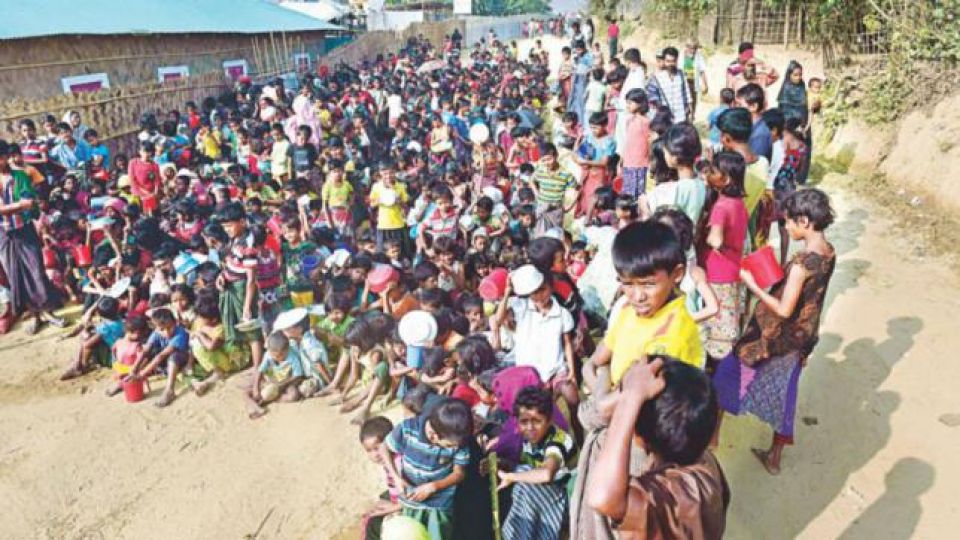December 6, 2019
Transparency International Bangladesh has painted a grim outlook for the crisis.
Bangladesh faces long-term financial, political and security challenges as Rohingya repatriation may not happen anytime soon, said Transparency International Bangladesh (TIB) Executive Director Dr Iftekharuzzaman.
The fund from the international community for nearly one million Rohingyas may not sustain as no strong international initiative has been taken to oblige Myanmar for creating a conducive environment for the refugees to return soon, he said.
“As a result, Bangladesh’s socio-economic instability will grow. There are risks of security at local and national levels. The crisis also creates political and diplomatic challenges for the government,” Iftekharuzzaman said.
It also involves the risks of growing extremism as the people who face violence are more likely to become violent, he said at a press conference during the launch of a report titled “Forcibly Displaced Myanmar Nationals (Rohingya) in Bangladesh: Governance Challenges and Way out” at the TIB office in the city yesterday.
According to the report, the funding for the Rohingyas from the international community is on the decline. Bangladesh got 73 percent of the projected fund in 2017, 69 percent in 2018 and 55 percent as of October this year.
The government of Bangladesh has so far spent Tk 2,308 crore on the Rohingyas since the latest influx of the refugees began on August 2017, the report said.
“This is a direct burden. Indirect burden is much more and it will continue to increase,” Iftekharuzzaman said.
Bangladesh had sheltered the Rohingyas on humanitarian ground, but the problem is lingering due to some influential countries and the international community, which have not done enough to oblige Myanmar to solve the crisis, the TIB executive director said.
He also lambasted the UN, China, India, and Japan for not preventing the military crackdown on the Rohingyas despite being aware of what was going on.
GOVERNANCE CHALLENGES
The TIB report revealed a host of challenges in managing the Rohingya crisis, including financial anomalies, lack of coordination among government and aid agencies, duplication of activities, and delay in approval of projects by the government bodies concerned.
The report, prepared between July 13 and October 30 this year, said the offices of the Refugee Rehabilitation and Repatriation (RRRC), DC and UNOs in Cox’s Bazar are doing the same work of monitoring and regulating the activities of the NGOs.
There is also a gap between the RRRC and the DC office in terms of sharing information, the report said.
As a result, NGOs have been facing delays in getting project approvals, work permissions, project completion certificates, and assessments of relief materials.
The report jointly presented by TIB researchers — Shahnur Rahman and Nazmul Huda Mina — says there are allegations of corruption and irregularities in the use of the grants received by the NGOs.
The government has no structure for ensuring accountability of the UN agencies and their implementing partners.
They are also allegation that the NGOs are not proactively disclosing their expenditure (operating expenses, program costs), the report said.
Although it is mandatory to allocate 25 percent of the grants for the host community, the provision is not being maintained properly.
There is also no guideline on how to follow this rule.
In addition, some of the international organisations are accused of spending more for administrative purpose than for programmes meant to the Rohingyas.
It is alleged that the standard ratio between operation cost and programme cost of the UN agencies and the partner organisations is often higher.
According to the information of seven UN organisations, during 2017-2019, the UN Women spent the highest (32.6 percent) for its operation while the Unicef had the lowest operation cost, 3 percent.
The report said the overhead cost is 14.7 percent for the International Organisation for Migration, 10.3 percent for the World Food Programme, 18 percent for the UN Population Fund, and 17 percent for the World Health Organisation.
Iftekharuzzaman recommended a stronger coordination among the government bodies, UN agencies, and NGOs to check the financial anomalies and duplication of work.
The aid agencies should make public their information on the projects, fund, and expenditure, he added.
Bangladesh government should sit with the stakeholders and take short-, medium- and long-term plans after critically analysing the risks the country may face due to the Rohingya presence, Iftekharuzzaman said.
It should then present the plan to the international community and devise ways how to assist the refugees and mitigate the risks the country faces.


